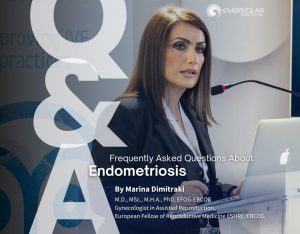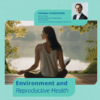
Frequently Asked Questions about Endometriosis by Marina Dimitraki, MD, MSc, MHA, PhD, EFOG-EBCOG Reproductive Assistant Gynecologist,
European Fellow of Reproductive Medicine ESHRE/EBCOG,
Deputy Scientific Director Embryolab.
1. Which women have endometriosis?
Women whose mother or sister have endometriosis, whose menstrual period started before the age of 11, who have short menstrual cycles (<27 days), who have heavy menstrual bleeding or long periods, and finally, women who have difficulty achieving pregnancy are at higher risk of developing endometriosis.
2. Can we prevent endometriosis?
Endometriosis cannot be effectively prevented yet. However, changes in lifestyle and adopting healthy habits seem to effectively reduce the risk of developing it. Thus, moderate physical activity, the use of contraceptive pills, and avoiding alcohol consumption – as alcohol affects the way the body metabolizes estrogen – can reduce the risk.
3. Is there a genetic background?
There is a genetic predisposition to endometriosis. Studies have confirmed its appearance in first and second-degree relatives. Since specific genes and mutations (ARID1A) have been implicated in endometriosis, the genetic burden is evident. In addition, environmental factors are also responsible for the expression of genetic predisposition. The genetic burden for endometriosis may come from both the mother and the father.
4. Is it easy to diagnose and how is it done?
Many women with endometriosis experience pelvic pain mainly during menstruation or sexual intercourse. Ultrasound can help with the diagnosis in case the endometrial tissue is detected in the ovary in the form of a cyst (endometrioma). However, laparoscopy is the preferred method for diagnosing endometriosis.
5. Is endometriosis related to infertility?
If a woman has endometriosis, she may have difficulty getting pregnant. Approximately 30-50% of women with endometriosis face infertility. Endometriosis can affect a woman’s fertility by causing anatomical changes due to the formation of adhesions and blockages of the fallopian tubes, changes in the immune response, compromising the quality of the eggs due to modifications in their hormonal environment, and negative impact on the environment for the embryo implantation in the uterus. However, the degree to which endometriosis can affect a woman’s fertility depends on the extent and severity of the condition.
6. Is hormone therapy recommended?
As endometriosis is a hormonally dependent condition – requiring the presence of estrogen to develop and grow – it is obvious that any hormone therapy that can suppress estrogen levels may be effective in improving symptoms or achieving pregnancy. Birth control pills, progesterone, and hormonal drugs that suppress hormones in the menstrual cycle have been successfully used.
7. Is conservative or surgical treatment recommended or something else?
The treatment of endometriosis is highly individualized. Surgical treatment, as it can reduce the extent of endometriosis and restore the anatomy of the internal reproductive organs, may increase the chances of spontaneous conception. The combination of surgical and hormonal/pharmacological treatment can increase pregnancy rates in women undergoing in vitro fertilization.
8. Is exercise and diet connected to endometriosis?
Diet plays a significant role in the clinical manifestation of endometriosis as it helps the woman’s body suppress inflammation associated with endometriosis and contribute to the smooth metabolism of estrogens. Positive effects are:
• plant fibers as they participate in reducing circulating estrogens
• Omega-3 fatty acids suppress the inflammation that characterizes endometriosis
• trace elements such as calcium, magnesium, and zinc contribute to muscle relaxation and reduce dysmenorrhea.
It is recommended to avoid the consumption of caffeine, alcohol, red meat, processed foods, sugar, and possibly gluten and dairy products as they are associated with an increase in estrogen levels, expression of inflammatory factors, and exacerbation of pelvic pain.
Regular exercise helps improve the symptoms of endometriosis as research shows that swimming, fast walking, and cycling contribute to improving pelvic pain, mood, sleep, constipation, and strengthening the muscles of the pelvic floor, improving the clinical symptoms of endometriosis.





